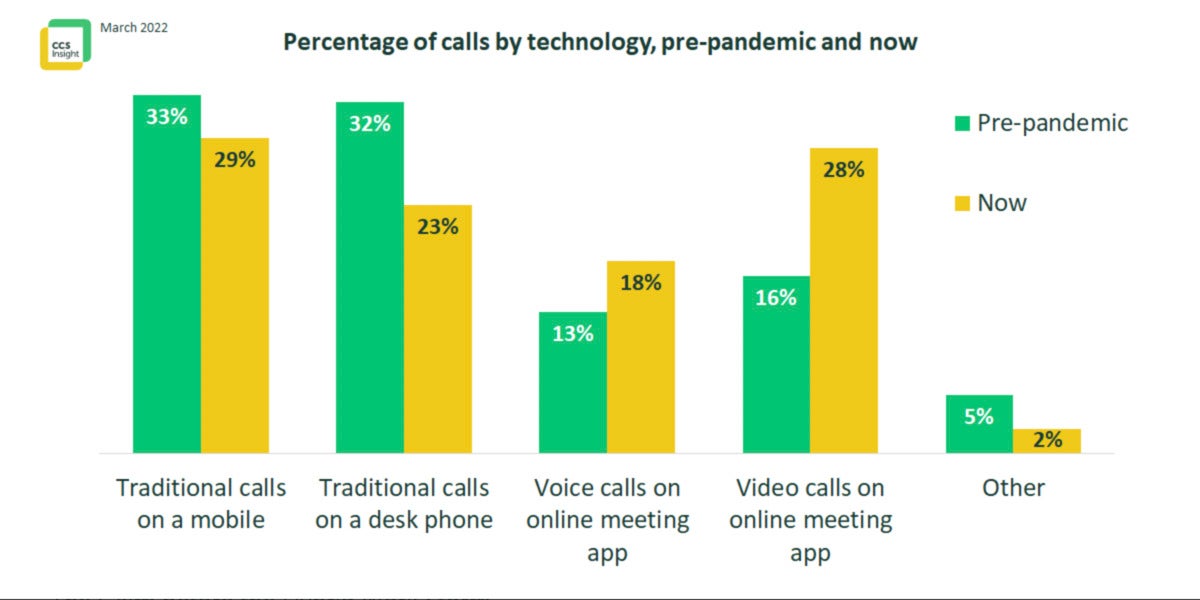































Poor fixed networks and unreliable Wi-Fi in offices could hamper hybrid/remote work strategies, according to a survey from analyst firm CCS Insight.
The Employee Workplace Technology Survey 2022, which polled 611 employees in US and Europe, cited slow fixed networks in corporate offices as the biggest connectivity frustration (37%). Poor mobile signals (30%), unreliable home Wi-Fi (29%), and corporate office Wi-Fi (29%) were also cited.
Corporate networks will soon be placed under even greater strain as employees return to the office due to an increase in video meetings.
"One piece that is being underestimated at this point is having lots of video calls within the organization, and lots of people joining video calls even within the office environment," said Angela Ashenden, principal analyst at CCS Insight. "The difference this will have is not generally recognized."
Flexible hybrid work arrangements such as hotdesking and the use of informal meeting areas could require better Wi-Fi connectivity, in particular. "A lot of businesses..., their Wi-Fi doesn't stand up to that level of usage," said Ashenden. "You might have a Wi-Fi network, but it's not designed for everyone to use all the time; it's designed for specific scenarios such as when you go into a meeting room or for a guest in the building."
If employees face problems connecting with colleagues via video when offices reopen, this could have a "real impact on the perception of the value of being in the office," she said.
The survey highlighted how meeting habits have shifted during the COVID-19 pandemic. Online meeting apps now account for 46% of all work calls, compared to 29% pre-pandemic. This includes both video calls, used for 28% of work calls (up from 16% pre-pandemic), and voice calls via online meeting apps, now used for 18% of calls (up from 13%).
Microsoft Teams and Zoom were the biggest beneficiaries here, with usage increasing more than 50% in 2021, according to the survey; they are used by 47% and 41% of employees, respectively.
Despite many offices reopening to enable face-to-face contact, most employees (40%) still expect the use of video meeting apps to increase in the next 12 months.
 CCS Insights
CCS Insights The pandemic has changed how people communicate in the office with their colleagues.
Voice calls made via mobile phones and desk phones declined 20% compared to pre-pandemic levels. There also appears to be little appetite for more calls, with almost a quarter (24%) of respondents planning to reduce their use of desk phones in the next 12 months.
"The assumption is that we're defaulting more to video calls than we are to voice calls," said Ashenden.
The survey also highlighted attitudes to hybrid work, with 62% of respondents favoring some level of remote work post-pandemic, though only 27% would like to work remotely all the time, down from 34% in 2020. Three days of remote work each week was the preferred hybrid option.
Almost a fifth (18%) of survey respondents believe their company is not at all ready for the shift to hybrid work.
 Tags chauds:
réseautage
Logiciel de productivité
Travail à distance
La vidéoconférence
Tags chauds:
réseautage
Logiciel de productivité
Travail à distance
La vidéoconférence